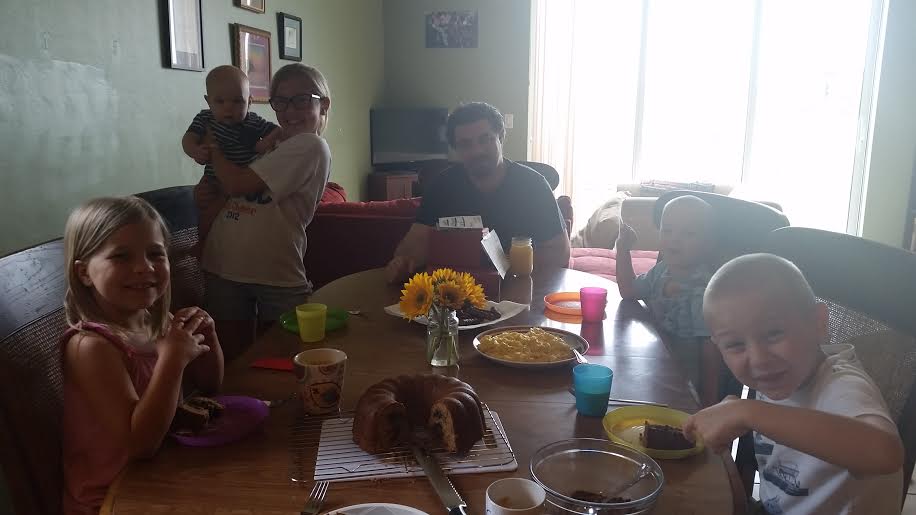I’m not a huge fan of Mark Shea, the Patheos blogger. I don’t agree with his “seamless garment” theory of social justice, and I despise the vitriol with which he lashes out at those who disagree with him. So when I read this piece by him last night, I was shocked to find that underneath the political nastiness is a man who is both compassionate and, remarkably, unwilling to judge the state of another’s soul.
Whether it’s in the combox or general posting, the Catholic blogosphere is thick with accusations of sin. Commentors who have never met each other feel not only justified but morally bound to point out the obvious mortal sin that a fellow commentor or blogger is engaged in, which they can clearly identify in those telling two sentences. People feel that it is perfectly within their right to urge a blogger to get him or herself to a priest (and not, mind you, any priest…better make sure he’s an FSSP priest or an Opus Dei priest or, for the love of God, anything but a Jesuit) and confess their awful, dirty, mortal sin lest they infect the body of Christ with their wickedness. There’s lots of mudslinging and sanctimoniousness and even just outright Schadenfreude parading around the Catholic blogosphere under the mantle of “The Church Militant.” It makes me angry, it makes me sad, and sometimes I seriously wonder how our beautiful Church will ever survive what we do to her.
But then I stumble across a post like Mark’s, from a wholly unexpected source, and have a renewed faith in the ability of Christ to teach us how to love. You really ought to go read the whole post.
There was one part that deeply resonated with me. Mark is talking about his admiration for a gay Catholic named Perry Lorenzo, and he goes into a little bit of detail about his own perspective on gay relationships:
“And if somebody embraces this particular form of concupiscence and indulges it, I will say what I say about all such choices to sin: God forgives sin so who am I to judge? Indeed, I have talked to priests who tell me that there are people they counsel in gay relationships for whom it best to allow the relationship to continue for the time being since, for reasons specific to that relationship, it would result in something more destructive to end it. I can completely believe this (which will no doubt shock some of my more conservative Catholic readers for whom scorched earth is always better then accomodating human weakness). There is, after all, often real love present in homosexual relationships, however disordered, and love should be strengthened and perfected, not crushed with contempt.”
I actually shed a tear when I read that. It shows such a great compassion for humanity, a compassion that I have rarely seen in my life. This is the type of compassion and love which I believe Christ has for us, and which we almost never have for each other.
I made the always unfortunately decision to venture down to the combox after reading the post. The nastiest comments were the ones about the paragraph I quoted above. Here’s a gem for you:
“Co-habitating is scandalous whether or not one is actually acting against chastity. As Christians we are to avoid giving scandal. That is part of our teaching once again going back to the New Testament.
Your omission of these basic points is troublesome at the very least. It either shows a lack of knowledge about such basic teachings of the faith that you should have a pause in continuing your public apostolate as a “Catholic” writer until you complete a remedial course in moral theology, or you are fully aware of these categories and withheld them from your opinion piece thus confusing the faithful about such clear issues as the intrinsic gravity of homosexual acts as well as the avoidance of public scandal in which case you need to remove this piece from the public domain. If it was consciously and willfully done, then you need to remove this from the public domain and get to Confession.”
And another: You theology is a little flawed here although it would be perfectly acceptable to Martin Luther.
One from the Catechism:
Have we all disregarded Church teaching?
1868 Sin is a personal act. Moreover, we have a responsibility for the sins committed by others when we cooperate in them:
– by participating directly and voluntarily in them;
– by ordering, advising, praising, or approving them;
– by not disclosing or not hindering them when we have an obligation to do so;
– by protecting evil-doers.
One from an all-knowing seminarian:
…if any confessor encourages that a person keep the near occasion of sin at hand, then surely he has neither compassion nor understanding. Absolution is absolute, so too should be the desire to reform, if though we should fail.
And this one, my personal favorite:
If you’re a regular reader of this blog, you know by now that our first daughter was conceived out of wedlock when I was a drug addict. Obviously, neither the Ogre nor I were living virtuous lives at the time, but the reality of a child on the way forced us to try and straighten ourselves out.
We began seeing a wonderful Cistercian priest who helped us work through that difficult time. One of the biggest issues facing us was the question of what to do when the baby was born. The Catholic Church doesn’t allow couples who conceive a child out of wedlock to marry in the Church until the child in question is a year old. It’s a wonderful rule, one that not only discourages shotgun weddings but also encourages the couple in question to spend that year discerning whether or not it is God’s will that they should marry each other or marry at all. It also shows the Catholic Church’s concern that people learn to live an open, fully integrated human life; no covering up the results of sin with quickie nuptials. No, the couple must learn to bear the consequences of their sin (the consequence historically being public shame, NOT the baby itself) and rectify their lives publicly.
But it left us with a dilemma. If we followed traditional moral advice (which we received unsolicited from several people), we should live apart during that year. Obviously the responsibility for caring for the baby would fall to me, the mother, and the baby would live with me. But this would leave all three of us in dire straits at best. I was emotionally and mentally unstable at the outset of the pregnancy, issues which only marginally improved during the pregnancy. The Ogre was trying to finish his undergraduate degree while working nearly full time at a steakhouse to support us. He would have very little time to see me and the baby if we lived somewhere else, and wouldn’t be able to contribute substantially to her parenting for an entire year. I was in no state to live alone with a baby, but strained relationships with both of our parents left me with no viable alternative. Furthermore, there was no way the Ogre could afford to pay rent or utilities for two separate apartments.
The other option was that we live together but maintain a chaste relationship. “Live together like brother and sister” was the phrase we heard repeated over and over. This is a task that is widely acknowledged to require heroic virtue from even the most virtuous, yet the likelihood that two people who hadn’t attempted to live virtuous lives basically ever would be able to accomplish it was somehow not of interest to solicitous advice-givers.
It was of interest to our priest, however. He was interested in a great many things everyone else overlooked. He spent hours with the Ogre and I, together and separately, figuring out our strengths, our weaknesses, our fears, our limits, our feelings for each other and our hopes for the future. I suspect he recognized that we had both lived in a state of chronic, habitual mortal sin for years and quickly decided that a quick “get out of mortal sin fast” card was not what we needed; at least, not then. I believe his ultimate goal for us was not short-term but long-term. He was trying to figure out how to bring both of us into a state of grace, how to practically, emotionally and spiritually help us learn to love God, each other and our child, and how to begin building a foundation that might one day support a solid family.
If it sounds like a daunting task, it was. For everyone involved. After a few months, he advised us to get civilly married so that we might begin to rectify our lives publicly and legally, and to live together as a family after the marriage…not as brother and sister. He very gently told us that the great strain it would put on us both at an already intense and tumultuous time would likely be too much for us to bear, and that it would be better for us to slowly bring our lives into conformity with Christ. Of course, the Ogre would not be able to receive communion, which was a burden I’m only now beginning to realize the heaviness of.
Not everyone agreed with his advice. Few people did, actually. There was talk of “giving scandal” and avoiding our company so as to not participate in our sin. At the time, the criticism hardly even registered with either of us, as consumed as we were by the staggering difficulty of what many saw as “baby steps” or “too-weak correctives” in our lives. The parish we belonged to refused to baptize our daughter, and our Cistercian priest did her baptism himself, at a parish half an hour away, in a private ceremony. The marriage preparation couple at the diocese officially recommended that I not be received into the Church, as they did not find evidence of “sincerity” in me during the three-hour class they taught to twenty couples. Once again, our priest stepped up to the bat, writing a vehement letter to the bishop detailing his careful guidance of us both and the long, arduous path we had taken to rectify our lives.
Our priest knew us. He loved us. He was given immense wisdom, I believe, in everything he said to us and every step he recommended we take. After the birth of our daughter I plunged into crippling post-partum depression that left me quite literally unable to care for her until I was put on medication. The medication, in turn, numbed me so completely that I would sit and stare out the window for hours at a time, barely able to complete the most basic tasks required in her care. I shudder to think what might have happened had I been living alone, or with anyone other than the one person I needed the most, the one person who believed in me more than anyone, the one person who knew even when I didn’t that I would pull out of it and recover.
I believe with all my heart that any path other than the one our priest set us on would have ended disastrously for our family. “Scorched earth” is a pretty apt term for what would have been left of the three of us if the Ogre and I had been pressured and brow-beaten into attempting to correct our lives at once. I believe that because even being on the slowest path possible out of mortal sin was almost too much for us. There were so many close calls, so many narrowly averted crises. We almost didn’t make it to a place of relative stability, and we wouldn’t have if weren’t for God’s infinite patience, mercy, love and grace. He let us move slowly, and he loved us in spite of it.
There are many in Mr. Shea’s combox who would have soundly denounced our priest and us for the long road we took. They would have been wrong, and furthermore it wouldn’t have been any of their business. Giving scandal by brazenly and unrepentantly engaging in sin is one thing; slowly and painfully attempting to reconcile one’s life to Christ is quite another, even if at first glance they might look like the same thing. No one can know a person’s heart, nor the struggles he undergoes as the Holy Spirit works on him. We ought to have more compassion for one another, and more faith that God will find a better way to reach souls suffering in sin than through rough-handed comment box castigation.











